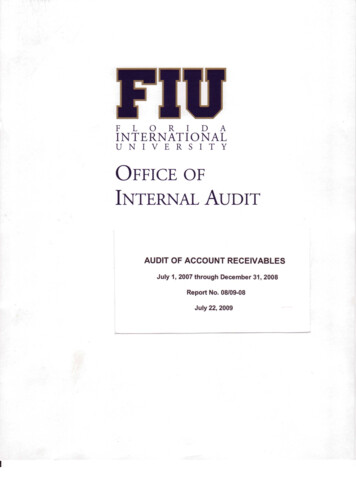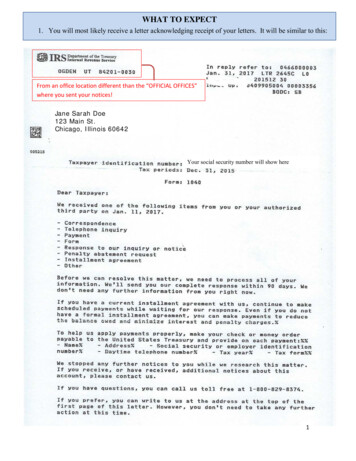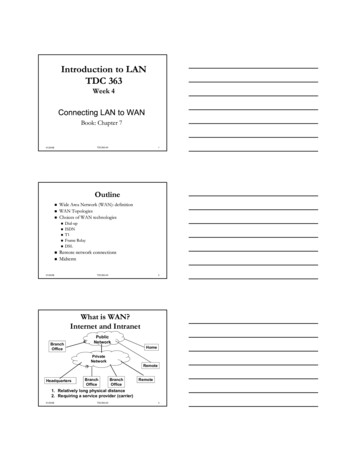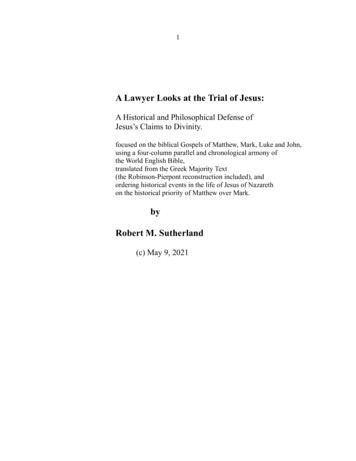
Transcription
I FLORIDAINTERNATIO ALUNIVERSITYOFFICE OF INTERNAL AUDITDate:July 22,2009To:Albert Maury, Chair, and Members of the Finance and Audit CommitteeFrom:Allen Vann, Audit DirectorSubject:Audit of Accounts ReceivableWe conducted an audit of Accounts Receivable for the period from July 1, 2007 throughDecember 31, 2008. Our audit objectives were to determine whether there wereadequate controls and procedures in place to ensure that accounts receivables areproperly recorded, related allowances for doubtful accounts are appropriately calculatedand collection and write-off processes are adequately managed.Our audit disclosed that considerably greater effort is needed by the University'sdepartments responsible for managing receivables in the areas of collectingreceivables, aging receivables, providing support for how allowances are calculated andwhen all collection efforts fail, swifter write offs of receivables. In addition, moredetailed reconciliations need to take place on a more frequent basis and the entireprocess would benefit from more comprehensive written policies and procedures.We wish to express our appreciation for the cooperation and assistance extended to usby the personnel from the Controller's Office, Office of Sponsored ResearchAdministration (OSRA), and all the other departments involved in this audit.This audit was conducted by Albert Mayungbe.C:Modesto Maidique, University PresidentJavier Marques, Chief of Staff, Office of the PresidentGeorge Walker, Senior Vice President, Research & University Graduate SchoolAndres Gil, Vice President, Sponsored ResearchKenneth Jessell, CFO & Senior Vice President, Finance and AdministrationJoseph Barabino, Associate Vice President, OSRAThom Davis, Associate Vice President and ControllerIzhar Haq, Associate Controller and BursarMilagros Garcia, Associate Controller, Accounting and Reporting ServicesJorge Carvajal, Audit Liaison, Controller's Office
TABLE OF CONTENTSPageLetter of Introduction .1Objectives, Scope, and Methodology .2Background.2Findings and Recommendations .41.Improvements Needed In Collection Efforts .42.Need For More Comprehensive Aging of Receivables Reports .83.Comprehensive Procedures Supporting Allowancefor Doubtful Accounts Needed .104.Infrequent Accounts Receivable Write-Offs .115.Need for More Thorough and FrequentAccount Receivable Reconciliations .13Need for Comprehensive Policies and Procedures .156.
OBJECTIVES, SCOPE, AND METHODOLOGYThe primary objective of our audit was to determine whether there areadequate controls and procedures in place to ensure that accounts andnotes receivables (receivables), are properly recorded, related allowancesfor doubtful accounts are appropriately calculated and collection and writeoff processes are adequately managed.Our audit included the University’s receivables for the period July 1, 2007through December 31, 2008. At calendar year end, FIU’s unaudited grossreceivable balance was 97,324,959 net of an allowance for doubtfulaccount of 17,806,562.1 Of this amount, 45.2 million was for tuition andfees; 14.9 million for Office of Sponsored Research Administration(OSRA); 6.6 million for Housing and Residential Life (Housing); and 1.9million for Department of Parking and Transportation (Parking). Thebalance of 28.7 million was for various departments within the University.The audit included tests of the accounting records and such other auditingprocedures as we considered necessary. We reviewed policies, observedand tested current practices and processing techniques, interviewedresponsible personnel, and tested selected transactions. Sample sizes andtransactions selected for testing were determined on a judgmental basis.Audit fieldwork was conducted between March 1, 2009 and April 30, 2009.BACKGROUNDThe University’s receivable balance and the corresponding allowance fordoubtful account have grown steadily between FY 2006 and FY 2008 asdepicted in the following efor %200840,947,69314,833,20736%Fiscal YearSince the end of FY 2008 (6/30/08), the allowance at calendar year-end(12/31/08) grew by another 20% to 17.8 million. Student Financialsinformed us that the tuition and fees receivable was high because theUniversity was closed from December 24, 2008 to January 4, 2009 withlast day to pay January 2, 2009, which was after the audit period.1This includes a notes receivable balance of 1,466,356 and allowance for notesreceivable of 1,123,586.Page 1 of 15
The allowance for doubtful accounts represents the portion of theUniversity’s receivables that in the estimation of management may not becollectible. It has grown significantly and is high when compared toothers in the Florida State University System. In fact, as depicted in thefollowing table, FIU has the second highest allowance for doubtfulaccounts percentage in the State University System as of June 30, 2008:InstitutionFlorida Agriculturaland MechanicalUniversityFlorida InternationalUniversityFlorida AtlanticUniversityUniversity ofWest FloridaUniversity ofSouth FloridaFlorida GulfCoast UniversityUniversity of FloridaFlorida StateUniversityNew College ofFloridaUniversity ofCentral FloridaUniversity ofNorth 0%Various University departments have responsibilities relating to managingreceivables and their related allowances, including: Student Financials,Housing,Parking, andOSRA.Page 2 of 15
FINDINGS AND RECOMMENDATIONSBased on our audit, we have concluded that considerably greater effort isneeded by the University’s departments responsible for managing receivablesin the areas of collecting receivables, aging receivables, providing support forhow allowances are calculated and when all efforts fail, swifter write offs ofreceivables. To this end, more detailed reconciliations need to take placefrequently and comprehensive written policies and procedures need to bedeveloped.Details of our findings and recommendations follow.1.Improvements Needed In Collection EffortsStudent FinancialsWith the exception of OSRA and Parking (citation only), the StudentFinancials group is responsible for all the university collection activities.The University Registrar classifies students into active and inactivestatus based on their registration record. Active students are studentswho have registered for a class within a twelve month period. Studentswho do not meet this requirement are classified as inactive. StudentFinancials contact active students about their account balance via emailand message board communication that is displayed to students as theyaccess their record on-line.We were informed that students whose outstanding receivable is 1 to 20days delinquent are prevented from receiving their transcripts ordiplomas, while students that are more than twenty days delinquent areprevented from registering for class. However, during our review, wenoted that a student who had outstanding receivable of 1,191 from thesummer of 2005 was allowed to register for the spring and summersemester of 2009. Personnel of Student Financials informed us that theylifted the registration hold for the student because the student made apartial payment and completed a promissory note.Personnel of Student Financials informed us that they would lift theregistration hold placed on a student record if partial payment/promissory note is made by the student but they have no documentationof this procedure.Inactive students with outstanding receivables are not contacted directlyby Student Financials, but rather the account of such students was in thepast referred to a collection agency. However, we were informed thatStudent Financials is in the process of finalizing a contract with acollection agency. Delinquent accounts have not been referred to acollection agency since 2000. Student Financials personnel indicatedthat they were reluctant to contact inactive students due to the legalissues surrounding the active collection of consumer debt. In effect, thePage 3 of 15
last time inactive students were contacted about their outstandingreceivables was over eight years ago. We reviewed the proposalStudent Financials received from the prospective collection agency andnoted that it was dated January 31, 2008 and were informed that thecontract was signed June 24, 2008. Additionally, we were informed thatController’s Office did not take further action in collections during thistime due to the departure of the Controller.OSRAOSRA also needs to improve how it manages collections of itsreceivables. Their accounts receivable balance as of December 31,2008 was 14.9 million. Our review of four delinquent accounts, totaling 735,146 disclosed the following exceptions: The first documented collection effort for a 76,989 invoice to BoozAllen Hamilton, Inc. dated September 12, 2005 occurred more thanthree years later on February 6, 2009, during the close-out processfor the project. An email communication to FIU dated February 27,2009 from Booz, Allen Hamilton, Inc. disclosed that they previouslyreturned the invoice because it was billed for incurred costs( 66,641) instead of the “Firm Fixed Price” ( 76,989). The Miami-Dade Transit Authority was not contacted about thestatus of an outstanding invoice for 105,000 dated May 5, 2008until October 14, 2008, more than five months later.Thisreceivable remains outstanding and there is little evidence ofcurrent collection efforts. Florida Agricultural and Mechanical University was not contactedabout the status of eleven unpaid invoices until November 18, 2008after the contract had already ended on October 31, 2008. Ourreview disclosed that; one of the invoices for 93,630 was datedNovember 27, 2006; three invoices, totaling 45,028 were issuedbetween March 29 and July 9, 2007; and six invoices totaling 38,867 were issued between March 6 and August 23, 2008. The first documented communication with the United StatesNational Park Service for twenty-one invoices, totaling 375,632issued between March 18 and October 30, 2008 occurred in March6, 2009.The examples cited above indicate that OSRA’s collection effort needsimprovement.When revenues from grants and research fundedactivities are not collected, they place an undue burden on cash flow andfund balances.Page 4 of 15
We previously performed an Audit of OSRA’S Billings and Collections(report No. 05/06-07, dated June 29, 2006). Our findings andrecommendations, at that time, related to: (a) inability to consider allfactors contained in grant agreements while calculating accountsreceivable and deferred revenue; (b) invoice billings missing essentialinformation, such as invoice date, the proper period covered by theinvoice, and the correct invoice amount; (c) lack of reconciliation ofreceivable logs to PantherSoft General Ledger (GL); (d) Lack of centralpoint of collection for payments; and (e) lack of documented policies orprocedures for billings and collections.We attributed many of the noted deficiencies to the lack of an automatedsystem for processing billings and tracking collection effort. Managementagreed to acquire an automated grant module for its billings andcollection processes. The grant module is scheduled for implementationon July 13, 2009. Our review also disclosed that, OSRA has notdeveloped policies or procedures for collection activities. To their credit,our review of OSRA deposit for December 2009 disclosed that thechecks were either sent directly to OSRA or were forwarded to OSRAwho prepared the deposit form and deposited the check at StudentFinancials.ParkingFIU is doing better at managing parking receivables. In March of 2008,the State Auditor General reported (audit report No. 2008-120) thatcontrols over parking citation receivables needed improvement.According to their audit report, the citation receivables recorded inParking subsidiary ledger were not reconciled to the University GL;relevant information, such as name and address necessary for collectionwere not always available; and academic holds were not always placedon the records of students for nonpayment of citation and parkingobligations.Our current review disclosed that the Controller’s Office performed areconciliation of the aging receivable report provided by Parking to theUniversity GL for December 31, 2008. We also noted that Parkingforwards detailed information about citations issued to the Controller’sOffice every quarter. We judgmentally selected 21 citations issued in2008 and noted that: (a) Parking personnel had pertinent informationabout the vehicle owner, such as name and address; (b) the recipient ofthe citations were sent collection letters; (c) delinquent citation werereferred to a collection agency after 365 days if linked to a Panther IDand sooner, 120 days, if the citation cannot be linked to a Panther ID;and (d) effective November 2008, Parking started placing registrationholds in addition to diploma/transcript holds on active students who aredelinquent in paying for citations. The results of our review indicate
22.07.2009 · Subject: Audit of Accounts Receivable We conducted an audit of Accounts Receivable for the period from July 1, 2007 through December 31, 2008. Our audit objectives were to determine whether there were adequate controls and procedures in place to ensure that accounts receivables are properly recorded, related allowances for doubtful accounts are appropriately calculated and











